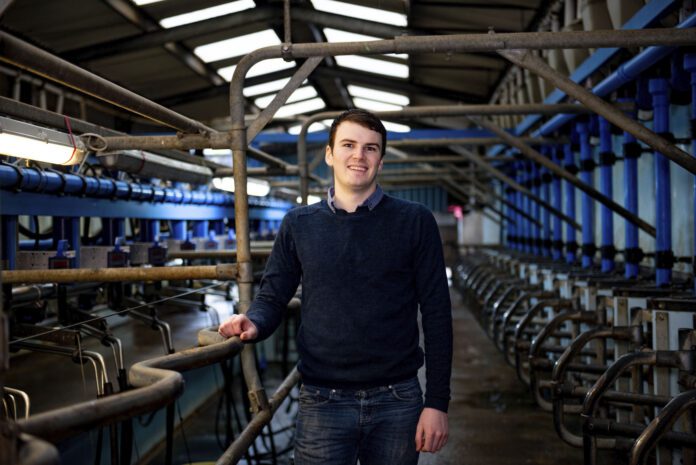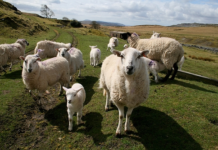A Farming Connect initiative is helping a young Welsh farmer inform decision making on upgrading milking facilities at his family’s dairy farm.
Ieuan Evans lives at Rhiwarthen Isaf, Capel Bangor, where he and his family farm 1,100 acres.
They milk 800 cows across two units with half the herd milked in a 44-point rotary parlour and the others in a 20/40 herringbone.
As they target herd expansion, they are outgrowing these facilities.
Ieuan believes robotic milking could be an option and applied for a Farming Connect Management Exchange Programme bursary in 2019 to explore this technology further to inform his own decision making and that of other dairy farmers contemplating upgrading their own milking facilities.
“With the development of robotic milking making a massive breakthrough in the last 10 years, there is no better time to think about automating/semi-automating our systems such as milking and feeding to reduce our day to day workload significantly,” he says.
“Farming is seen as a traditional and dated industry but we need to harness technology to help us produce food in a manner that satisfies today’s modern trends with consumers in a sustainable manner.”
As his family is also seeking to increase slurry storage capacity, Ieuan was also keen to learn from the experiences of the farms he visited on his Management Exchange.
“We have already taken steps to minimise the effect of our slurry on the environment by investing in an umbilical slurry system with a disk injector, but more can be done,” says Ieuan.
“We are looking to increase our slurry storage capacity so that slurry is only applied when it would be of most nutritional benefit to the fields and would be less susceptible to leaching.”
Ieuan’s study took him to the Agri-Epi South West Dairy Development Centre in Somerset and to Worthy Farm, Glastonbury, where the Eavis family has invested more than £2 million in a robotic rotary milking parlour.
There was also a visit to Bauernland AG in west Germany, a dairy farm with the latest version of the DeLaval AMR robotic rotary milking parlour, and to Dendoldrum Farm in Inverbervie, Scotland, where the high yielding herd is milked in seven Lely Astronaut stall milking robots.
“Seeing is believing – some of the technologies I saw during my visits were initially thought of as complex and things of the future, but upon closer study it can be broken down to a simpler system with different parts undertaking different tasks,” says Ieuan.
Yet the cost of installing robots in a large-scale dairy system is “massive”, he concludes, and investment is a decision that should not be taken lightly.
But he believes costs will reduce and the throughput and functions of robotic milking will increase to make them appealing to more farmers.
Ieuan’s study taught him that there can never be too much data in dairying.
“The increased use of technology on dairy farms allows more and more parameters to be measured and masses of data recorded like never before,” he says.
“If the data is analysed correctly by the farmer/herdsman it could be used as an extremely powerful tool that could even detect problems before they occur.”
Ieuan reckons there is great value in visiting farms to see what others are doing.
“All of the little techniques, systems and methods that other farms use on a daily basis could be passed on and make a difference to the way your farm is run, it could save you a few seconds, minutes or pounds every day. They say knowledge is power and farm visits are an excellent way to transfer knowledge,” he says.
Farming Connect, which is delivered by Menter a Busnes and Lantra, has received funding through the Welsh Government Rural Communities – Rural Development Programme 2014-2020, which is funded by the European Agricultural Fund for Rural Development and the Welsh Government.
Help keep news FREE for our readers
Supporting your local community newspaper/online news outlet is crucial now more than ever. If you believe in independent journalism, then consider making a valuable contribution by making a one-time or monthly donation. We operate in rural areas where providing unbiased news can be challenging. Read More About Supporting The West Wales Chronicle
























